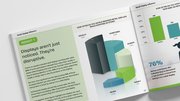Article
Fatto a mano: The seductiveness of luxury
A stroll through the streets of Florence highlights the true meaning of luxury in the post-recession world.

April 14, 2010
By Dr. Bob Deutsch
For several years my wife and I have kept an apartment in Florence, Italy, where we enjoy the Renaissance city's markets, museums, and way of life. Spending time in Florence has made me realize that when beauty surrounds, time elongates and the senses are heightened.
Take dining in Florence. All the restaurants are Italian. The menus are basically the same so you notice fine distinctions across the same dish in various restaurants. The classic Pappa pomodoro, a thick tomato and bread soup, varies slightly in smokiness and texture. Eventually you discern such differences, which permeate other aspects of your perceptual acuity.
One spring afternoon, a native-born friend and I strolled into La Vecchia Bettola, one of the oldest trattorias, for lunch. The food is delicioso, the aromas ignite taste buds and smile muscles; everyone is jovial, waiters and customers alike.
Across the room was a table with eight old men with palpable gleams in their eyes. I asked my friend, himself a well known Florentine, "Who are they?" He said these mostly balding men met here weekly. Each, a renowned craftsman — carpenter, ceramicist, frame maker, textile designer, art restorer, jewelry maker, shoemaker, tailor — enjoyed gigantic portions of blood-rare beefsteak di Florentine and Tuscan wine.
Fatto a mano
I asked if we might join them because I wanted to talk about fatto a mano, the value of hand-made luxury. After a short discussion, we carried our plates of coniglio arrosto, and Chianti to their table.
Following introductory toasts, I asked how they had become craftsmen. Each story was a unique blend of intention, serendipity and the stubbornness that comes with knowing where one's soul finds vitality.
What was common to these eight iconic diners were themes of sensuality, authenticity, passion and pride - narratives that result when what one does matches who one is and carries on a tradition of creativity dating back to the Medici.
The Italian way
These men taught me an important lesson about the meaning of hand-made luxury goods. I said, "So much today is mass-produced on the cheap. Do you think there were better times?" Their response: "What can be better than now? We are among friends. We are enjoying good food and wine. We feel good and are happy."
One man, nicknamed The Terminator for having been a ferocious footballer, added, "Time is on our side. The only time is now. 'The next' does not exist. The whole of life is right here, right now, in our sight." Therein lies the essence of luxury: living deep in the guts of the moment with senses fully alive. In that experience there is no time, only sensuality.
A state of sensuality
That state of sensuality is the Florentine way of life. Not only in the museums and studios, but also in the markets where proud vendors exhibit fresh-picked broccolini and varieties of prosciutto and pecorino, like art.
In Florence going to market is a joy. Even walking from my apartment to the Mercato San Ambrogio is to be relished. The textured facades of ancient buildings and landmarks like Brunelleschi's Duomo, dot my path. Walking is slowed by frequently looking around, peeking into shop windows that display jewelry, olive oil or lingerie — even men's underwear is displayed beautifully, like works of art.
At the market nothing is Saran-wrapped; everything is local. I pause to appreciate the voluptuousness of the fresh fruits and vegetables, the tubs of fiocchi di latte, stuffed ravioli, whole roasted pig, and vendors who handled their produce like gems. Tastings - una asagio - are offered. Salutations exchanged. Being at market is a personal experience, not a business transaction. I wasn't there to fill the refrigerator but to fulfill me.
For artisans, their life story lives in what they create. Who they are and what they make is completely authentic. The craftsman feels the press of the sensual, the immediate. Eye, hand and heart play in an improvisational dance, creating one-of-a-kind items true to the idea of the Renaissance.
Marketers can learn
The task of marketing is to help customers read their own story into the product story, to expand how customers think about themselves and their world.
With the luxury market rebounding, a new meaning of value is emerging. People are beginning a quest for self-authenticity, becoming more interested in seeking meaning. Many say, "I must be more selective in what I buy and what I buy into. I want things that will show me my heart."
One woman I interviewed who had recently purchased a Montblanc pen, said, "I've wanted to buy a great fountain pen for as long as I can remember. Despite the economy, or maybe because of it, I thought I should buy one now. It feels so sensual, so luxurious in my hand. I think better writing with it. It helps me get down my deepest thoughts and feelings. I find 'me' with this Montblanc in hand."
Real luxury is the experience
That's the real experience of luxury, no matter a product's price. People value experiences that take them beyond their present selves. Luxury can provide a venue for customers to recognize the potential in themselves.
Luxury is becoming more about the experience that makes you feel authentic, as if you are an artisan of self, with time to express your personal individuality and self-expansion. Luxury might best be defined as an investment in self.
As the meaning of luxury and value shifts from "Give Me More" to "Being More of Me," luxury marketers may find a consumer palette as ravenous as before the economic collapse. Like Florentine craftsmen, luxury marketers must live in the moment and help their customers do the same.
Dr. Bob Deutsch, a cognitive anthropologist, is president and founder of Brain Sells, a strategic branding consultancy in Boston.
 ChatGPT
ChatGPT Grok
Grok Perplexity
Perplexity Claude
Claude




